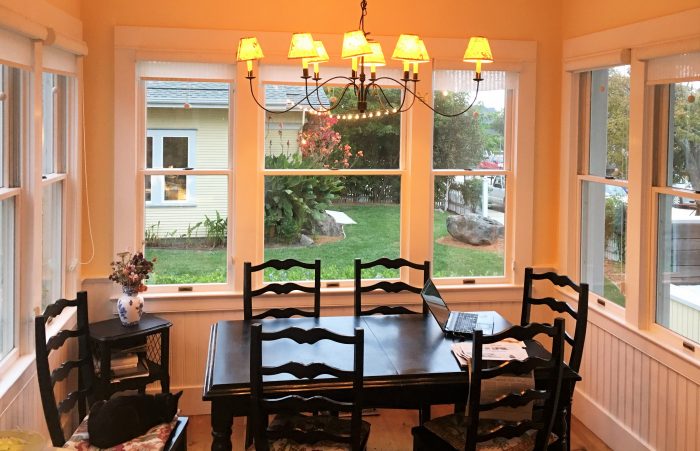I’ve been thinking a lot about our kitchen table lately.
Well-worn and inexpensive, it’s one of the centerpieces of furniture in our house, partly because it’s in the kitchen eating area, but more because it is where so much of our life has happened.
No matter how busy our lives became over the years, I always prioritized sitting down together for dinner as a family. Breakfast? Y.O.Y.O. (you’re on your own) was fine. Lunch usually happened wherever we were in our individual lives. But dinnertime was sacred. Coming together for a meal and to talk about our day as a family was sacred. Family meetings to discuss important things like upcoming vacations or issues that needed resolving happened at the kitchen table.
As we approach the emptying of our nest in a couple of months, I have strongly considered getting rid of the kitchen table. Not because it’s beat up (although, it is). But because its’ empty chairs boldly broadcast the fact that the kids are gone.
Sitting down to dinner with just one or two of us seems too sad. During the rest of the busy day I can convince myself that things haven’t changed that much—that our house isn’t “empty.” But that dinner table is a stark reminder in the 6-8 p.m. timeframe that things have definitely changed—likely forever. So replacing that old table with a new, smaller one seemed a fitting and transitional way to move into our next chapter.
Until I read Joy Harjo’s stunning, poignant poem, “Perhaps the World Ends Here,” which I’ve excerpted below:
The world begins at a kitchen table. No matter what, we must eat to live.
The gifts of earth are brought and prepared, set on the table. So it has been since creation, and it will go on…
Our dreams drink coffee with us as they put their arms around our children. They laugh with us at our poor falling-down selves and as we put ourselves back together once again at the table.
This table has been a house in the rain, an umbrella in the sun.
Wars have begun and ended at this table…
We have given birth on this table, and have prepared our parents for burial here.
At this table we sing with joy, with sorrow. We pray of suffering and remorse. We give thanks.
Perhaps the world will end at the kitchen table, while we are laughing and crying, eating of the last sweet bite.
(You can read the full poem here.)
The dreams, the coffee, the fall-aparts, the house in the rain, and the umbrella in the sun. All true.
A new table could perhaps be all of those things. But what if this same old kitchen table—that holds our histories, our secrets, our dreams—still has much to show us? What if the emptying of the nest is just another chapter in its’ very long life?
I’ve never ripped sad chapters out of a book I was reading. Is the kitchen table any different?
As I was cleaning the table today, noticing its familiar nicks and scratches, the circles where something too hot or too acidic or too wet sat for too long, I went more slowly. More tenderly. More thoughtfully. No longer seeing it as a functional workhorse, but as a silent witness to the life that has played out on, around, and under it—and I decided it needs to stay for a while longer.
If for no other reason than as an invitation for future chapters to be written upon it.
~











Read 3 comments and reply